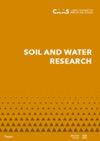Seasonal variations of vegetative indices and their correlation with evapotranspiration and soil water storage in a small agricultural catchment
IF 1.7
4区 农林科学
Q4 SOIL SCIENCE
引用次数: 0
Abstract
A precise measurement of evapotranspiration (ET) and soil water storage (SWS) is necessary for crop management and understanding hydrological processes in agricultural catchments. In this study, we extracted the vegetative indices (VIs, including normalised difference vegetation index (NDVI), soil-adjusted vegetation index (SAVI), and enhanced vegetation index (EVI)) from satellite images of the NuÄice catchment. We found a consistent seasonal pattern of VIs across the catchment with higher values and variation ranges during spring and summer and lower values and variation ranges during autumn and winter. Spatial variation of VIs also followed a seasonal trend, decreasing during crop growth and increasing after crop harvesting. Seasonal correlations were observed between monthly average ET and SWS with VIs throughout one crop season, which can be expressed mathematically as exponential functions. We propose that VIs can be used as a surrogate measure for ET and SWS in catchments with poor monitoring capabilities. Further studies are required to investigate the spatial distribution of ET and SWS throughout the watershed and their relationship with VIs. Furthermore, our research emphasises the importance of subsurface recharge in the water balance of the investigated fields. It suggests that subsurface flow may be influenced by potential gradients of the water table, driving its seasonal behaviour in response to bedrock morphology.小农集水区营养指数的季节变化及其与蒸散量和土壤储水量的相关性
AÂ精确测量ofÂ蒸散发(ET)和土壤储水(SWS) isÂ作物管理和理解水文过程所必需的inÂ农业集水区。InÂ本研究中,weÂ从卫星影像ofÂ中提取植被指数(VIs),包括归一化植被指数(NDVI)、土壤调整植被指数(SAVI)和增强植被指数(EVI)。WeÂ发现aÂ流域VIs的季节分布规律一致ofÂ流域VIs在春夏季值和变化范围较大,秋冬季值和变化范围较小。空间变化of VIs也符合aÂ季节变化趋势,作物生长期间减少,收获后增加。在一个作物季节,月平均ET和SWS与VIs之间存在季节相关性,可以beÂ数学表达式为asÂ指数函数。WeÂ建议VIs可以beÂ使用as aÂ替代测量方法来监测能力差的ET和SWS inÂ集水区。需要进一步的研究toÂ调查整个流域的空间分布of ET和SWS及其与VIs的关系。此外,我们的研究强调ofÂ地下补给inÂ水平衡ofÂ的重要性。ItÂ表明地下水流可能beÂ影响byÂ潜在梯度ofÂ地下水位,驱动其季节性行为inÂ响应toÂ基岩形态。
本文章由计算机程序翻译,如有差异,请以英文原文为准。
求助全文
约1分钟内获得全文
求助全文
来源期刊

Soil and Water Research
Water resources, Soil Science, Agriculture-WATER RESOURCES
CiteScore
4.60
自引率
0.00%
发文量
26
审稿时长
>12 weeks
期刊介绍:
An international peer-reviewed journal published under the auspices of the Czech Academy of Agricultural Sciences and financed by the Ministry of Agriculture of the Czech Republic. Published since 2006.
Thematic: original papers, short communications and critical reviews from all fields of science and engineering related to soil and water and their interactions in natural and man-modified landscapes, with a particular focus on agricultural land use. The fields encompassed include, but are not limited to, the basic and applied soil science, soil hydrology, irrigation and drainage of lands, hydrology, management and revitalisation of small water streams and small water reservoirs, including fishponds, soil erosion research and control, drought and flood control, wetland restoration and protection, surface and ground water protection in therms of their quantity and quality.
 求助内容:
求助内容: 应助结果提醒方式:
应助结果提醒方式:


